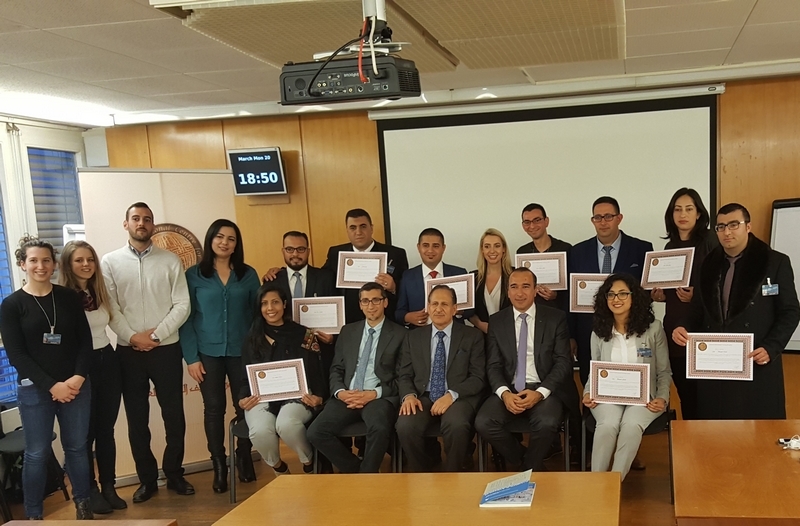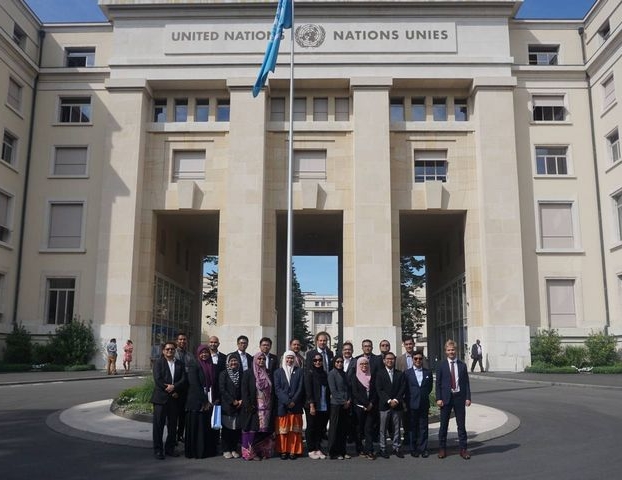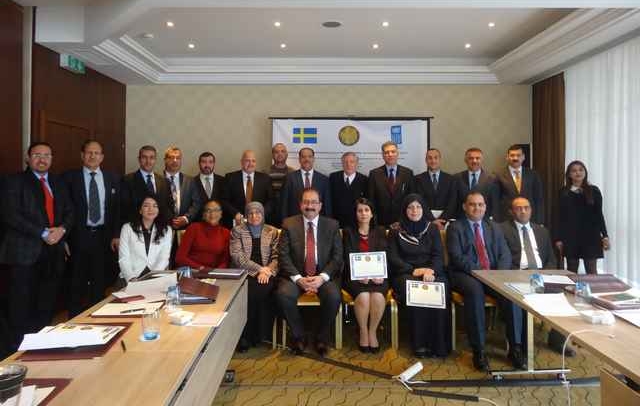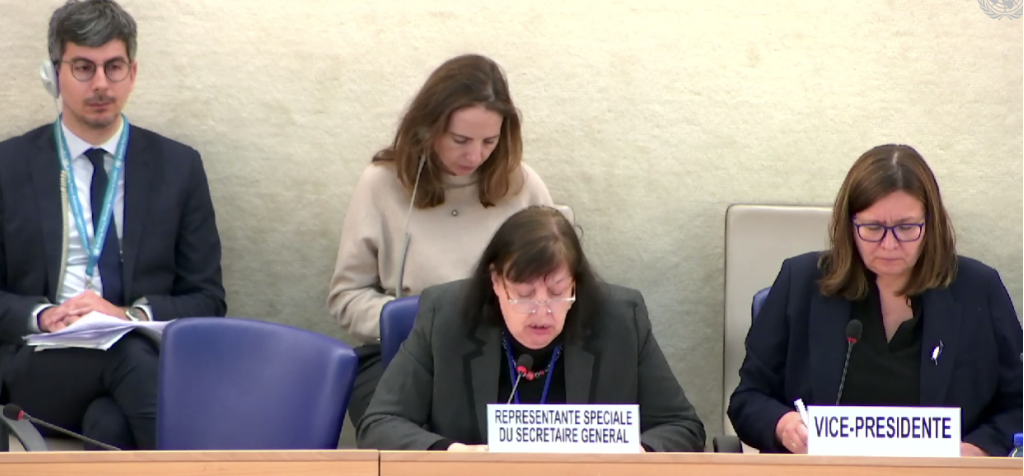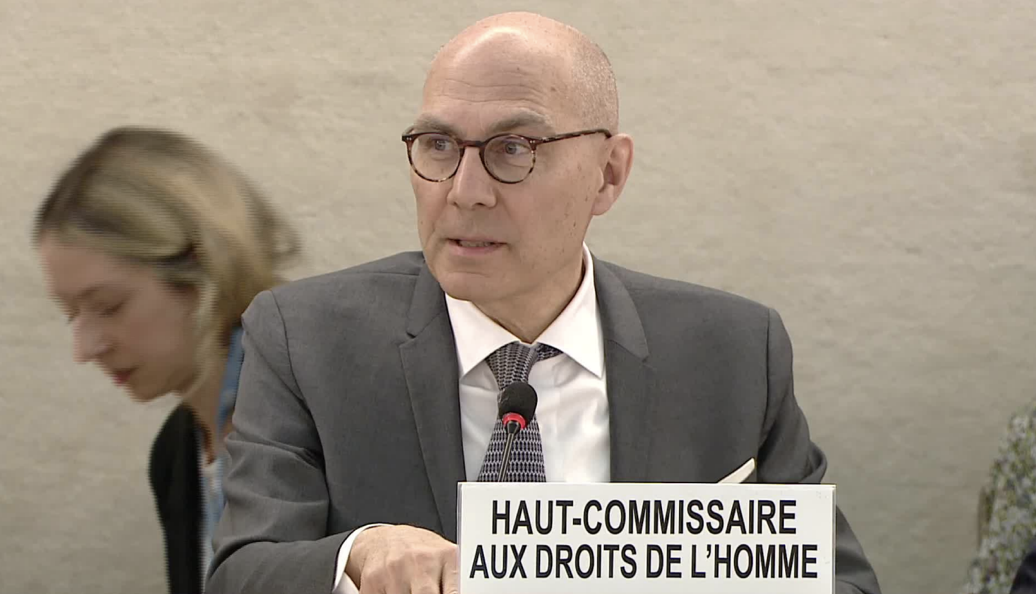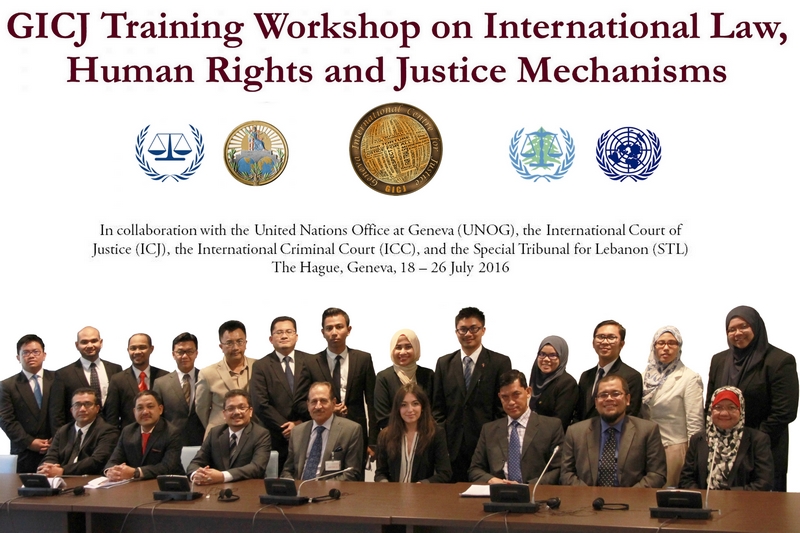
In collaboration with the United Nations, the International Court of Justice (ICJ), the International Criminal Court (ICC) and the Special Tribunal for Lebanon (STL), GICJ organized a Training Workshop on International Law, Human Rights and Justice Mechanisms for the period from 18th to 26th July 2016.
First part of the training: The Hague (18th-21st July 2016)
In the morning of the first day, H.E. Ahmed Nazri Bin Yusef, Ambassador of Malaysia at The Hague, welcomed the participants to the Netherlands. During the gathering, he then underlined the importance of the training workshop, and especially of holding it right in the “City of Peace and Justice”, home of the two main international judicial bodies, the International Criminal Court (ICC) and the International Court of Justice (ICJ).
In the afternoon of the same day, GICJ delivered two presentations. The first one focused on the United Nations, its creation, the main purposes and principles and its structure, including the different internal organs. In particular, it concentrated on the work and mandate of the General Assembly and the Security Council. In this respect, Mr. Naji Haraj, executive director of GICJ, presented the main activities of the UN since its birth as a response to the failure of the former League of Nations to prevent World War II. He described the great importance of the body as a forum for international cooperation, dialogue and discussion on the main global challenges, including peaceful settlement of international conflicts.
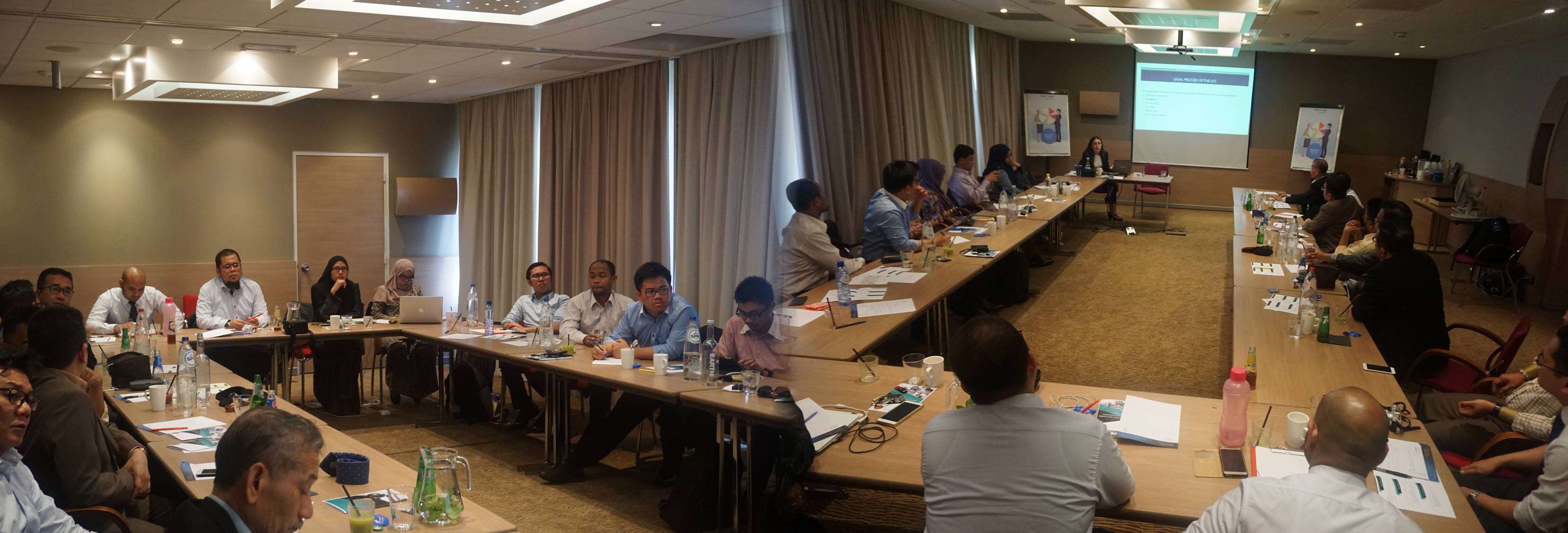
Despite the relevant achievements of the UN in certain areas, Mr Haraj pointed out examples of cases in which the UN failed to uphold the principles and objectives enshrined in its Charter, especially with regards to Palestine and Iraq. He stressed the biased position of the Security Council concerning the grave violations against the Palestinian people by the Israeli occupying power and how this organ has largely been prevented from taking appropriate action according to Chapter VII of the Charter. The same attitude prevailed in the case of the war of aggression launched by the US-led Coalition against Iraq in 2003. Mr Haraj explained to the participants how such war was not only a breach of the UN Charter, but was also accompanied by grave human rights violations which infringed international law.
The participants welcomed the explanations and posed questions mainly on the effectiveness of the body in addressing global challenges, such as conflicts and disputes. They were also interested in understanding the mechanisms behind the veto power of Permanent Member States in the Security Council and how political stagnation that derives from it can be overcome.
The second presentation focused on international law and justice mechanisms. In these regards, GICJ provided the participants with a better understanding on the main UN judicial organ, the ICJ, including its jurisdiction and its structure, according to its Statute. A second main focus of the presentation was that of understanding the steps taken by the international community towards the establishment of a permanent criminal court, the ICC. Ms Alessia Vedano, GICJ coordinator of the workshop, then presented the work of the Court, including its jurisdiction, mandate and structure and made a comparison between the two judicial bodies, including their different relations with the UN.
The participants showed a lot of engagement in the topic and asked clarifications on the role of the ICJ in addressing particular kinds of disputes, and how final judgements can be enforced. With regards to the ICC, they posed questions on the mandate of the Court and the influence of the Security Council with its work.
In the second day of the training, 19th July 2016, the practical part started. The participants attended a hearing at the Special Tribunal for Lebanon (STL) on the Ayyesh et al. case (STL-11-01). This Special Tribunal was established under Security Council Resolution 1757, Chapter VII, following a request from the Lebanese Government to investigate into the terrorist attack on 14th February 2005 in Beirut, which killed 22 people, including the former Lebanese prime minister, Rafik Hariri, and injured many others. The hearing was a re-examination by the Prosecutor, Mr Alexander Milne, to rebalance a number of assertions and statements made by the witnesses.
The group was then briefed on the work of the Tribunal, including its special mandate and structure by an expert from the Appeal Chamber, Ms. Anda Scarlet. She informed the participants that the Tribunal is an independent, judicial organisation composed of Lebanese and international judges. It is neither a UN court nor part of the Lebanese judicial system. It does, however, try people under Lebanese criminal law. The tribunal is also the first of its kind to deal with terrorism as a discrete crime.
The participants showed great interest in the matter and asked many questions on the relation between the STL and the Lebanese Court and requested clarifications on the role of the United Nations in setting up such Special Tribunal and whether this has impacted on the national judicial sovereignty of Lebanon.
A second practical part took place at the International Criminal Court (ICC) on the same day. On this occasion, the participants received two presentations by two experts of the Court: the first focused on the establishment of the Court, its mandate and jurisdiction, as well as its functioning, whereas the second consisted in a brief overview on the ongoing situations at the Court, and the challenges of arresting those accused or suspected of war crimes and crimes against humanity. Participants were informed of the stages of prosecution of the Court and how the body has a complimentary function – it does not intend to substitute national jurisdiction but to compliment it if there is no genuine proceeding taking place against individuals suspected of a crime falling under the Court’s jurisdiction.

Questions were posed by the group on the mandate of the Prosecutor, the role of the Security Council in reporting situations to the Court. Practical examples with regards to law enforcement were also requested.
Then the participants visited the main Courtroom of the building and received a detailed explanation on how trials work – including seats allocation in the room- and how the challenging task of protection of witnesses is implemented.
On the third day of the training, the 20th July 2016, the participants received a briefing on the work of the ICJ at the Peace Palace, which headquarters the UN judicial body. Through the explanation of the expert, the group gained a better understanding of the role of the Court in settling disputes between Member States and giving legal advice when requested. They were also informed that whether the former implies the formulation of a binding decision by the Court, the latter is in fact a non-binding advice that nevertheless will most likely be followed by those who have requested it.
In the context of a contention case between States, the expert emphasized that although there is no guarantee of sentence enforcement, it is common for those involved in the dispute to comply with the Court’s judgement on the matter since the decision of taking the case to the Court itself is a spontaneous and mutually agreed one and therefore usually reflects the willingness of the parties to resolve the dispute in a peaceful manner.
The group was then taken around the Palace by a guide from the Carnagie Foundation, the organization owning the building, and was briefed on the work of the another body hosted in Peace Palace, the Permanent Court of Arbitration (PCA). Its mandate and structure was thoroughly explained and the main Courtroom where the PCA deliberates was shown to the participants.
A tour of the Palace was also provided, during which the participants had an opportunity to visit the historical halls and rooms of the building and receive information on the architectural aspects of the Palace, including what art pieces are present and what is their meaning and origin.
Second part of the training: Geneva (22nd-26th July 2016)
The workshop then continued on the 22nd July 2016 in Geneva, where its second important part on the United Nations and the human rights mechanism started.
On the morning of that same day, the participants attended a meeting organized by GICJ in which they were briefed on the UN human rights mechanisms. In this context, the role and structure of the Office of the High Commissioner for Human Rights (OHCHR), tasked with strengthening the promotion and protection of human rights across its Member States, was presented, as well as the other main five human rights bodies. In particular, the presentation focused on the Human Rights Council (HRC) as a replacement to the Commission for Human Rights, its function and mandate and its regular and special sessions.
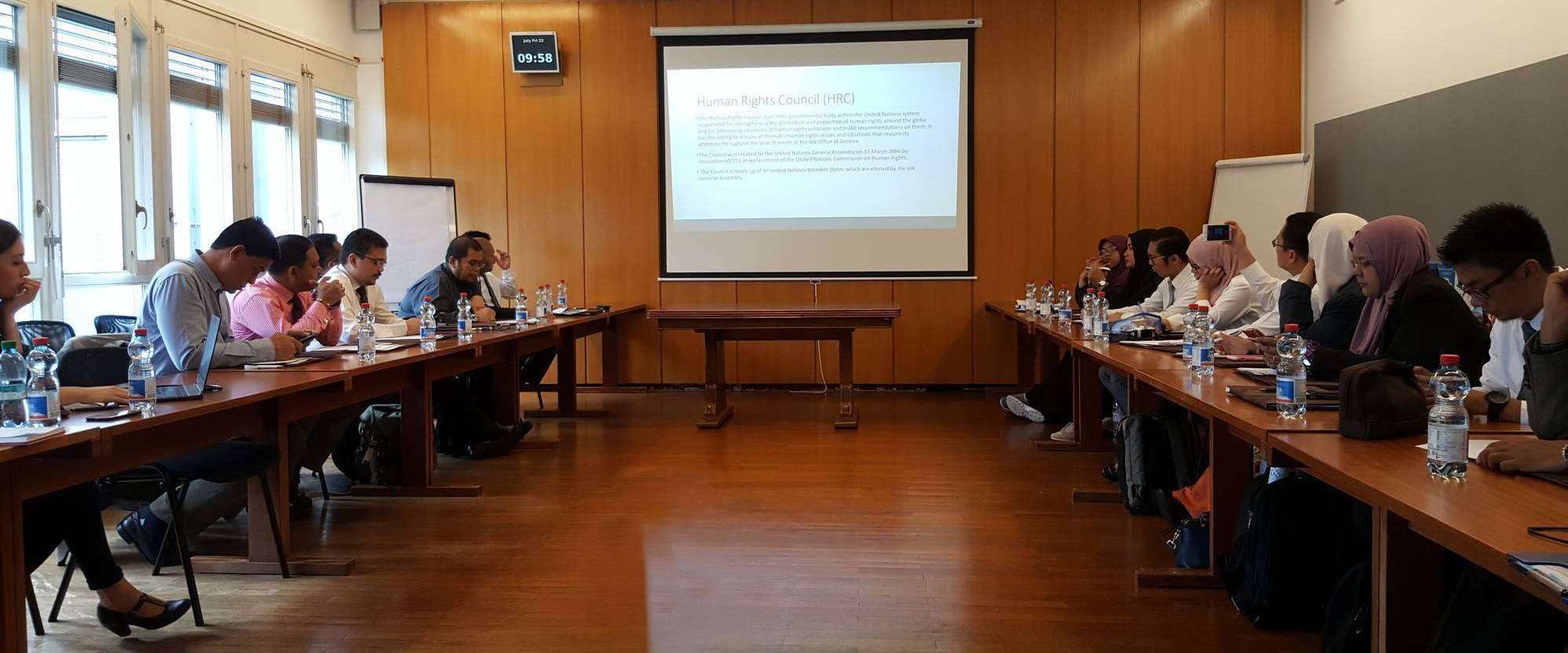
Ms Alessia Vedano, GICJ coordinator of the workshop, then explained to the participants what main issues are covered by each of the permanent agenda Items of the Council with a particular focus on the controversies of agenda Item 7, “Human rights situation in Palestine and other occupied Arab territories”.
She also explained how the NGOs engage and interact with the HRC during its sessions, mentioning in particular the work of GICJ in this context as an example.
GICJ presentation was followed by a lecture on the Universal Periodic Review (UPR) mechanism by Mr Jong-Gill Woo, Human Rights Officer of the UPR Branch for South-East Asia at the OHCHR. Mr Woo shared his expertise with the participants, especially with regards to the fundamental participation of NGOs to the mechanism. He provided the group with practical information on how NGOs can participate to national consultation sessions and request the government to include their views on human rights to the State reports to be submitted to the Session before the Review process.
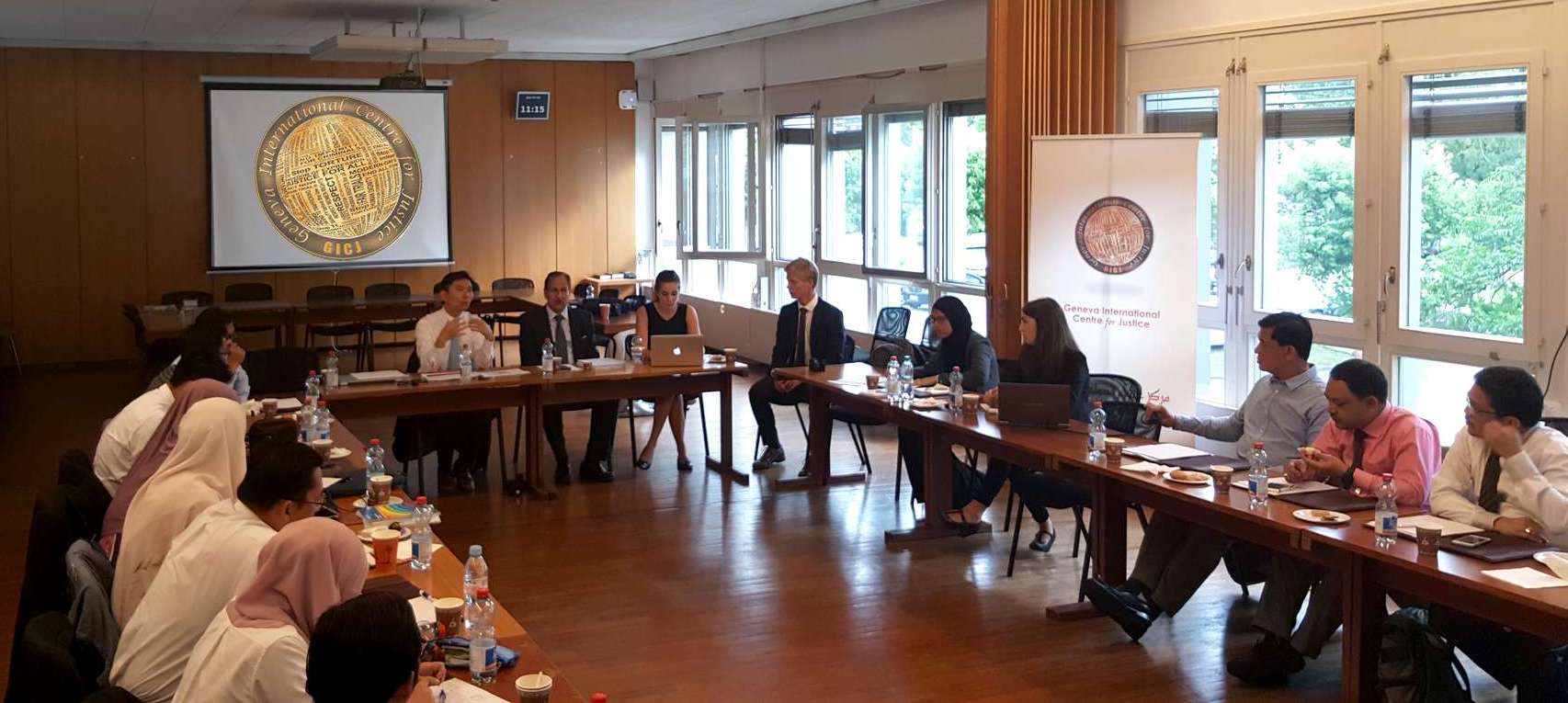
He also emphasized that NGOs hold the ability to submit themselves reports which shall give their perspectives on the human rights situation of the country under review. He explained the criteria followed by the UN experts when summarizing these reports into one. Mr Woo also stressed the great importance of NGOs in documenting the follow-up and implementation of the recommendations made by States during the review. The participants asked for more details on ways of engagement of NGOs throughout the UPR process, including technical advice with regards to deadlines and sources to use when redacting a report.
In the afternoon, the participants attended the second practical part of the workshop: a visit to the UN headquarters, Palais des Nations. During the visit, they were guided around the main historic halls and meeting venues and were briefed on the mandate and structure of the UN as well as what events and conferences take place in the building. The history of the international organization was also recalled during the visit, including its birth as a substitute to the former League of Nations, hosted in the same building.
On Monday, 25th July, the participants of the training workshop attended the Opening of the 58th Session of the Committee Against Torture (CAT). The meeting started with a few initial remarks from the Representative of the High Commissioner for Human Rights, who described the latest positive developments on human rights, including the conviction of the Former Chadian President, Hissene Habre, for crimes against humanity and war crimes. This event was particularly relevant in the context of combating impunity and providing accountability to the victims. The agenda for the Session was later adopted without additional comments.
The participants were then briefed by Mr Brad Smith, expert from the Committee on the Rights of Migrant Workers, on the role of Treaty Bodies within the UN human rights mechanism. He presented the work of the body and its main functions, as well as the characteristics that Treaty Body experts should embody, and stressed the major role of NGOs and Civil Society in providing solid and reliable information to the Committees. The participants seemed very interested and asked for more details on how information gathered by NGOs is selected as well as how the process of individual complaints is practically handled.
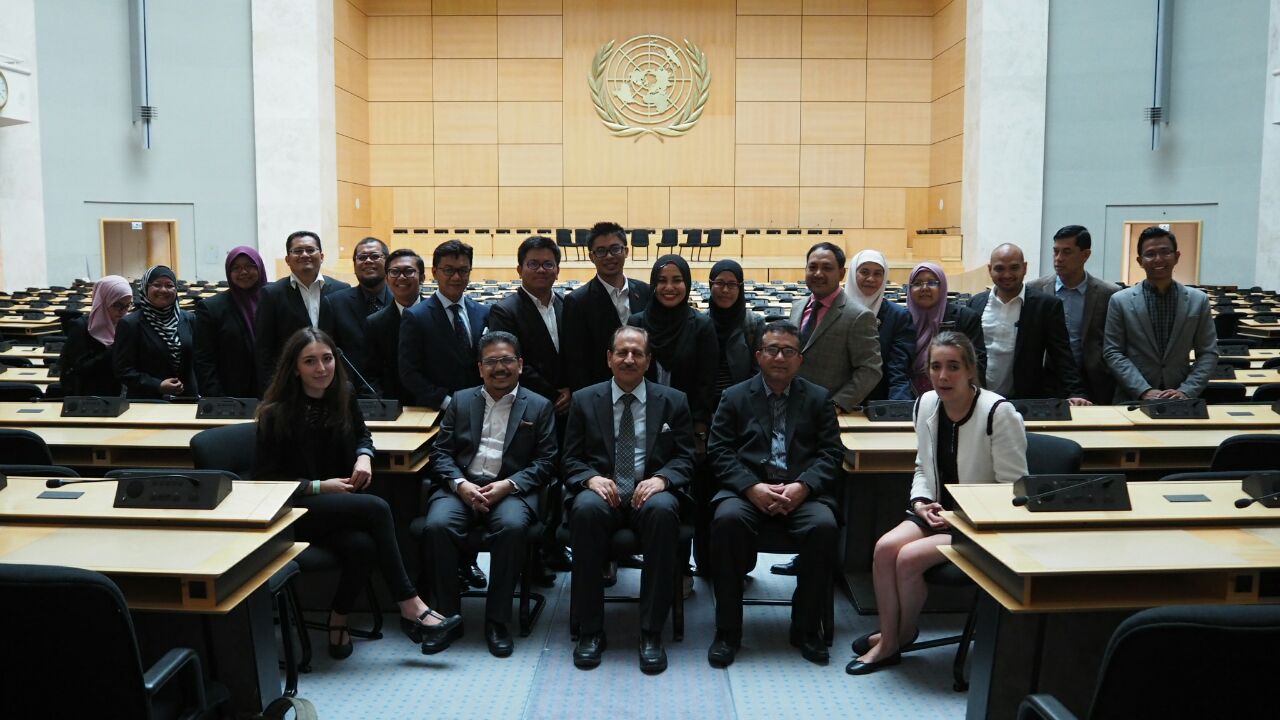
In the afternoon, the participants took part to a second meeting at the 58th Session of the CAT: the Consideration of Kuwait. During this time, they had an opportunity to understand the dynamics of such meetings, especially for what concerns the presentation of the report by the delegation of the State Party in question. The Kuwaiti representative from his part underlined the positive achievements of the country in promoting and protecting human rights and, in particular, in complying with the Convention. His presentation was then followed by questions from rapporteurs and other members of the Committee on the implementation of the treaty in the country and various requests of clarification on certain allegations of torture and other ill-treatments reported by multiple NGOs.
On the final day of the workshop, Tuesday 26th July, GICJ held a meeting in its offices, during which three presentations were delivered. The first presentation was given by Mr Naji Haraj, GICJ executive-director, who briefed the participants on the work of the Special Procedures. In particular, he explained the different types of mandate-holders, mandates and functions of this organ, as well as its relationship with the HRC and its interaction with Civil Society actors.
The second presentation, delivered by Mr Troy Björkman, GICJ human rights officer, provided the participants with practical examples of NGOs engagement with the HRC, including a guideline for the redaction of written and oral statements and an explanation on the ability of NGOs to organize side-events during the sessions of the Council. He then showed the participants how GICJ engaged with the Council during its 32nd Session: this included the submission of written statements and the delivery of multiple oral statements during the Interactive Dialogues and General Debates.

The third and last presentation, delivered by Ms Anne de Gressot, GICJ human rights officer, concentrated on the involvement and engagement of NGOs within the UPR mechanism. She showed the participants concrete examples of reports submitted by GICJ during previous UPR Sessions as well as some extracts from the Review of Malaysia in 2013 (2nd Cycle). This provided the group with a clearer overview of the UPR process, and in particular of the presentation by the State under Review of its National Report and of its responses to the advance questions, the interactive dialogue between Member States to ask questions and make recommendations on the human rights situation in the country, the concluding remarks by the State under Review, and finally, the initial adoption of the Report of the Troikas.
Conclusion of the training
The conclusive part of the training started with a discussion with the participants on the lessons learned and what aspects of the training they most enjoyed, as well as what improvements can be made by GICJ in order to better the program in the future. The feedback of the participants was very positive and they generally conveyed that the training provided them with a lot of in-depth information on international law, human rights and justice mechanisms as well as excellent opportunities of witnessing the real-life application of such mechanisms. The participants found that visiting the ICJ, the ICC and the STL as well as the headquarters of the UN was also one of the most stimulating parts of the training and represented a valuable learning experience as well as a unique chance to see some of the most important international bodies to govern international relations and administer justice across the globe.
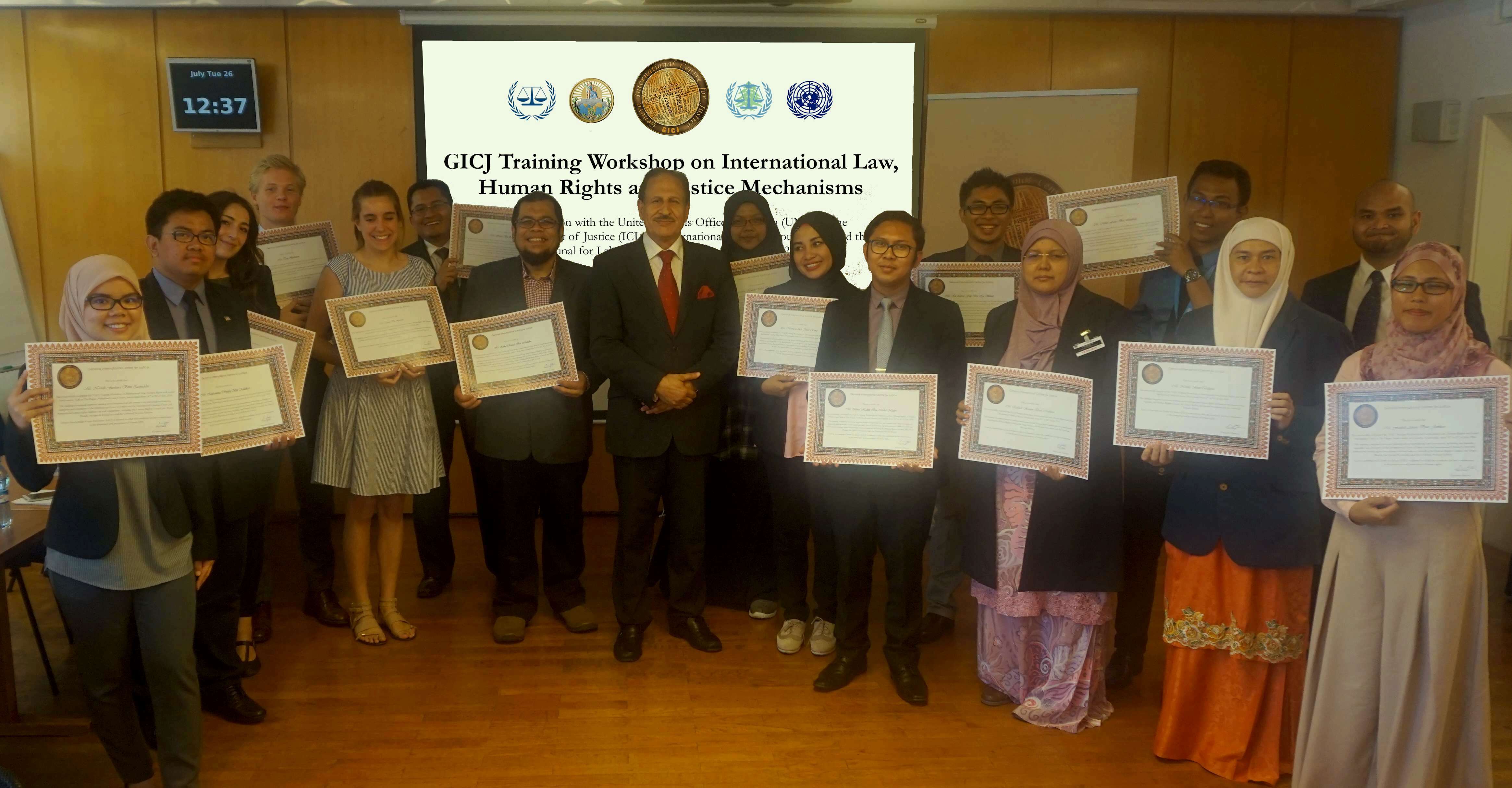
The training workshop finally ended with a closing ceremony, where all participants received an individual certificate for the successful completion of the programme and for their commitment to the protection and promotion of human rights and international justice.
Pictures taken during the workshop:
|
Geneva International Centre for Justice Human Rights Training Courses
|
Trainings organised by GICJ in collaboration with International Bodies |
Internship and Volunteer Opportunities |
||
|
GICJ, OHCHR and Meezaan Organization for Human Rights Training workshop - 14 to 21 March 2017 |
GICJ, UNOG, ICJ, ICC and STL Training Workshop - 17 to 26 July 2016 |
|








